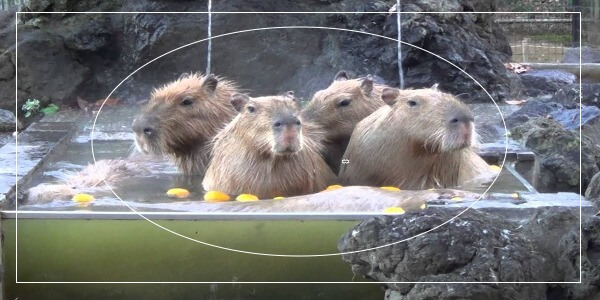As these friendly rodents gain popularity as exotic pets, prospective owners are eager to learn more about the costs of bringing a Capybara baby into their homes.
Understanding the price range and other factors involved in acquiring a capybara is essential for making an informed decision and ensuring the well-being of these unique creatures.
This blog post will delve into capybara baby prices, providing valuable insights into what potential owners should consider before committing from discussing the average price range to exploring the legal considerations and care costs.
We aim to equip you with the knowledge necessary to make an informed decision about capybara ownership.
What Is The Average Price Range for Baby Capybaras?
The average price range for a baby capybara can fall between $1,500 and $5,000. However, it’s crucial to do thorough research and contact local breeders or exotic pet sellers to understand the prices in your area.
Remember that these figures are subject to change and can be influenced by market trends, demand, and other economic factors.
It’s important to note that the price range provided here is an estimate and can vary depending on the factors mentioned below:
- Location: The price of baby capybaras can vary significantly based on your country or region. The price may be lower in countries with more prevalent or easier-to-import capybaras. However, the cost can be higher due to limited availability in areas where they are less common or face stricter regulations.
- Breeder Reputation: Reputable breeders who prioritize their capybaras’ health, temperament, and genetics may charge higher prices. These breeders invest time, resources, and expertise to ensure their capybaras are well-cared for and bred responsibly. The quality and lineage of the capybara may also influence the price.
- Availability: The availability of baby capybaras can affect their price. If there is high demand and limited supply, the cost may increase. Conversely, when there is a surplus or if capybaras are being actively bred, the price may be more affordable.
Where to Buy a Baby Capybara?
If you’ve found yourself captivated by their cute appearance and curious personality, you might be wondering where to buy a baby capybara of your own.
1. Online Platforms
Online platforms offer convenience and access to a wide range of sellers. Websites such as Exotic Animals for Sale, Hoobly, or even social media groups dedicated to exotic pets may have listings for capybaras.
When using online platforms, it’s crucial to exercise caution and do thorough research before purchasing.
Look for reputable sellers with positive reviews and a proven track record of ethical breeding practices. Ask for references or testimonials from previous buyers to ensure the seller’s legitimacy.
Additionally, be prepared to arrange transportation for your capybara if the seller is far from your area.
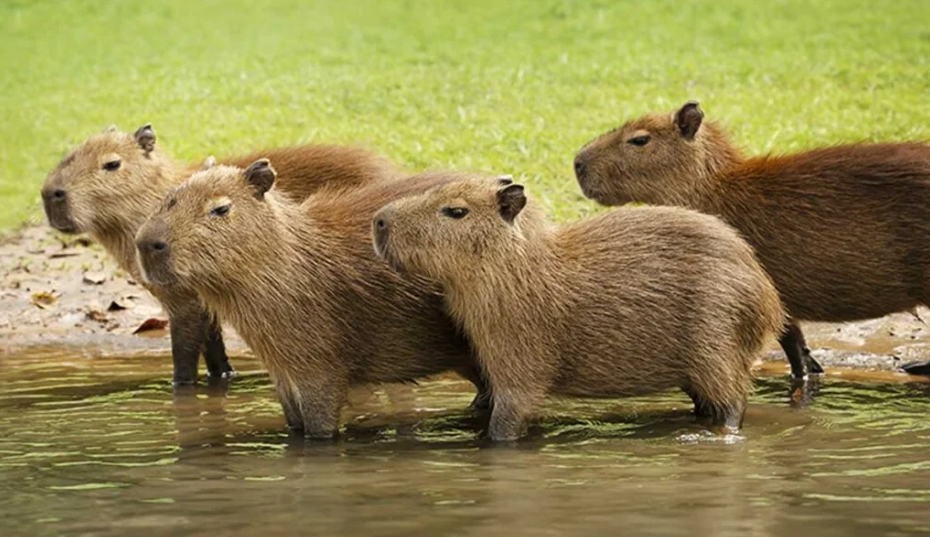
2. Specialized Breeders
Working with specialized breeders is often a preferred option for purchasing a baby capybara. These breeders focus on producing healthy, well-socialized capybaras and can provide valuable guidance throughout your ownership journey.
When choosing a breeder, consider factors such as their experience, reputation, and dedication to the well-being of their animals.
Reputable breeders prioritize their capybaras’ health and happiness and ensure they are bred responsibly. They may also provide important documentation, such as health certificates and lineage information.
Visiting the breeder in person is advisable to observe the living conditions and interact with the capybaras.
This will give you a firsthand experience of how the breeder cares for their animals and allows you to ask questions about their breeding practices.
3. Exotic Pet Stores and Animal Sanctuaries
Some exotic pet stores or animal sanctuaries may occasionally have baby capybaras available for purchase or adoption. These establishments often have knowledgeable staff who can provide valuable insights and guidance on capybara care.
When visiting an exotic pet store, ensure they have proper permits and licenses to sell capybaras. Verify that the animals are well-cared for and kept in appropriate enclosures.
On the other hand, animal sanctuaries may offer opportunities to adopt capybaras that were rescued or cannot be released back into the wild.
Keep in mind that availability at these locations may be limited, and it’s essential to inquire about the capybara’s background and ensure that its origin is legal and ethical.
RELATED:
What are the Ongoing Costs Associated With Owning a Baby Capybara?
Like any other pet, baby capybaras have various expenses that should be carefully considered before leaping.
1. Nutritional Needs
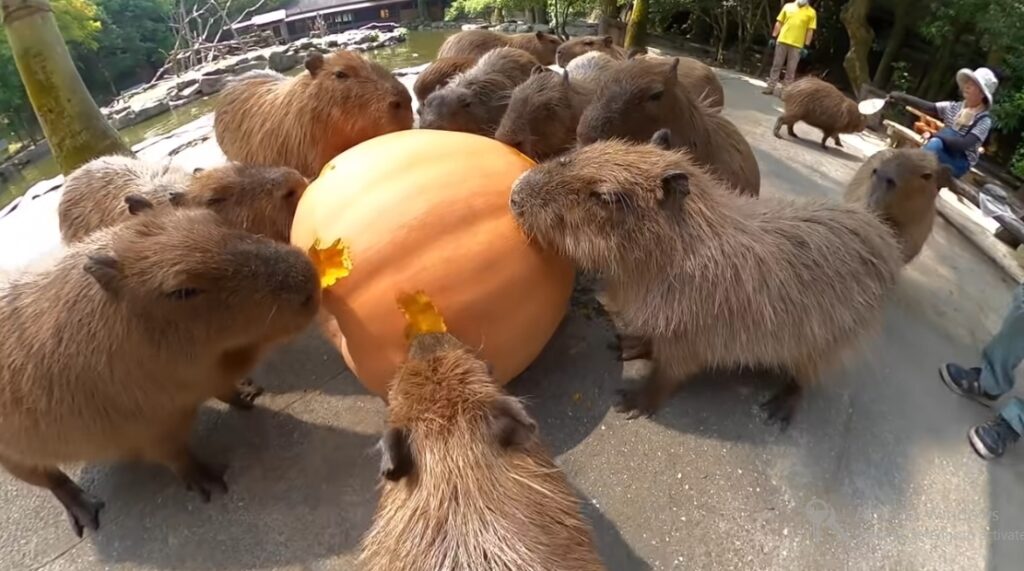
Their diet mainly consists of grass, hay, fresh vegetables, and specially formulated capybara pellets. Depending on where you live and the availability of capybara-specific food, the monthly cost can range from $50 to $100.
Also, add occasional treats like fruits or specific supplements to their nutritional care.
2. Veterinary Care
Regular veterinary check-ups are crucial to ensure your capybara’s health and well-being. These visits include vaccinations, deworming, dental care, and general health assessments.
It’s recommended to find a veterinarian experienced in exotic animal care. The cost of veterinary care for capybaras can vary, but budgeting around $200 to $500 annually for routine visits is a good starting point.
3. Enclosure Setup and Maintenance
Creating a suitable habitat for your capybara is essential. They need a spacious and secure enclosure that allows them to roam, swim, and engage in natural behaviors.
The cost of setting up an enclosure can vary based on factors like size, materials, and enrichment items. Budgeting for fencing, shelter, pools, bedding, and toys, you can initially expect to spend anywhere from $500 to $2000.
Additionally, there will be ongoing maintenance costs, including cleaning supplies, bedding replacements, and periodic repairs.
4. Enrichment and Entertainment
Capybaras are social animals and thrive with mental and physical stimulation. Enrichment activities, such as providing toys, puzzles, and play structures, are essential to keep them happy and prevent boredom.
Allocating a budget of $50 to $100 per year for capybara-specific enrichment items can help ensure their well-being and provide a stimulating environment.
5. Insurance and Emergencies
Consider pet insurance for exotic animals like capybaras. While it may not cover routine expenses, it can be a lifesaver in unexpected accidents or illnesses.
The insurance cost will vary based on factors like coverage limits, deductibles, and the age of your capybara. Be sure to research reputable pet insurance providers and consult with them to determine the best coverage options for your Capybara needs.
Notice: Don’t forget about the miscellaneous costs of owning a capybara. This includes bedding materials like straw or wood shavings, cleaning supplies, grooming products (if needed), and potential travel expenses for vet visits or relocation. Setting aside a small monthly budget of around $20 to $50 for these miscellaneous expenses is wise.
What Are The Possible Challenges With Owning a Capybara?
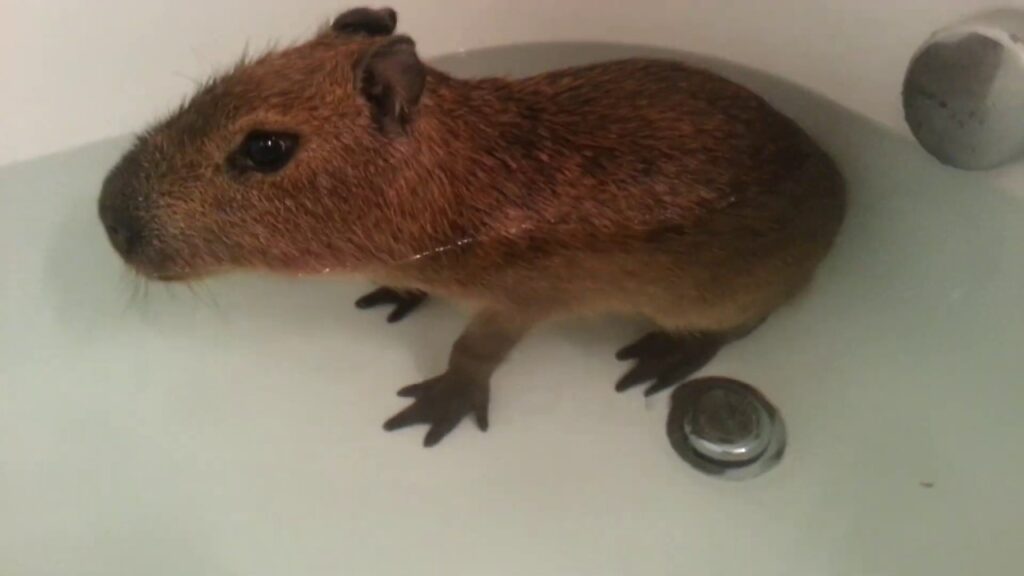
Native to South America, capybaras have found their way into homes worldwide, bringing unique challenges for their owners.
1. Space Requirements
Providing a suitable enclosure miming their natural habitat can significantly challenge owners. Capybaras need access to land and water areas for exercise, swimming, and socialization.
Setting up and maintaining an appropriate enclosure with enough space can be time-consuming and may require a substantial financial investment.
2. Socialization Needs
Keeping a solitary capybara can lead to loneliness and behavioral issues. Therefore, owners should consider providing companionship for their capybara by owning multiple capybaras or ensuring regular social interactions with other compatible animals.
This may involve introducing them to other capybaras or finding alternative social outlets, which can be challenging for some owners.
3. Specialized Diet
Obtaining a reliable and sustainable source of appropriate food can be challenging, especially in regions where capybaras are not native.
Additionally, their diet needs to be carefully balanced to avoid nutritional deficiencies or obesity, which can be a demanding task for owners.
4. Veterinary Care
Finding a veterinarian with experience treating capybaras can be challenging in some areas. Capybaras require specialized veterinary care, including routine check-ups, vaccinations, and potential treatment for specific health issues.
Owners must be prepared to invest time and effort into finding a qualified veterinarian who can provide the necessary care for their capybara.
5. Time Commitment
Capybaras are not low-maintenance pets. They require a considerable amount of time and attention from their owners. Regular interaction, exercise, and mental stimulation are crucial for their well-being.
Owners must be prepared to dedicate quality time to their capybara, as neglecting their social and emotional needs can lead to behavioral problems.
6. Legal and Ethical Considerations
Owning a capybara is subject to specific legal regulations that vary depending on the country, state, or region. Prospective owners must thoroughly research and comply with the laws regarding capybara ownership.
Additionally, ethical considerations surround the acquisition and care of capybaras as pets. Ensuring that capybaras are obtained from reputable sources and promoting their conservation in the wild is crucial.
Conclusion
While the average price range for a Capybara baby can vary depending on location, breeder reputation, and availability, it is crucial to understand that the cost of bringing a Capybara into your life goes beyond the initial purchase price.
Ongoing expenses, such as habitat setup, food, veterinary care, and other supplies, should be factored into your budget.
Furthermore, the decision to own a Capybara baby should not be solely based on price. It requires careful consideration of your lifestyle, commitment, and ability to meet the specific needs of these social animals.
Time, space, and resources must be available to provide the Capybara with a suitable environment and ensure its physical and emotional well-being. Staying informed about the legal considerations of owning a capybara in your area is vital.
Understanding the local laws and permit requirements will help you navigate the legal aspects and ensure compliance, protecting yourself and the Capybara.

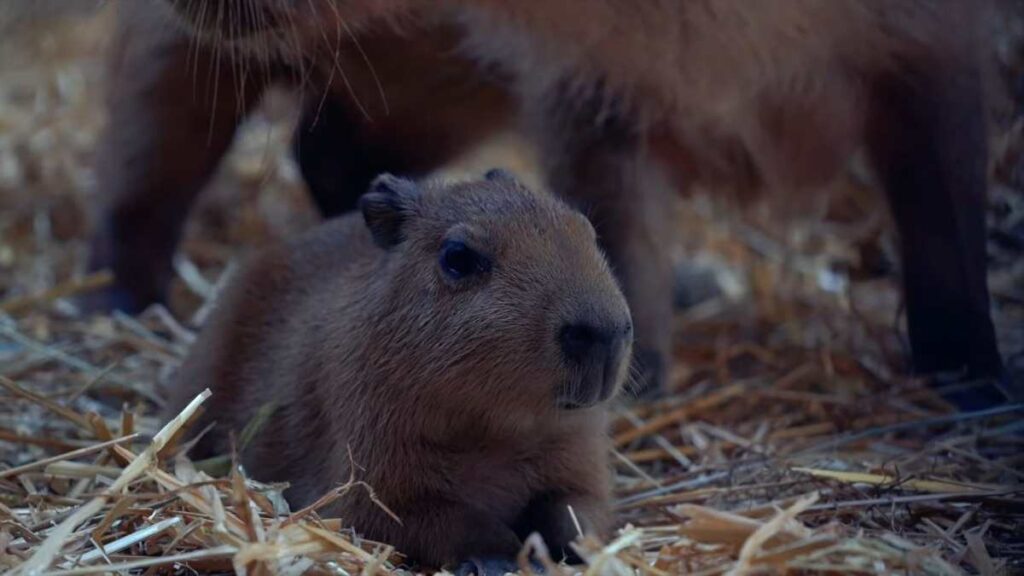
![Capybara Meat And Its Culinary Uses - [Every You Should Know] Capybara Meat & Culinary Uses](https://capybaratips.com/wp-content/uploads/2023/03/Capybara-meat-250x200.webp)
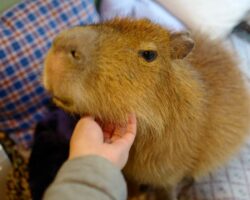
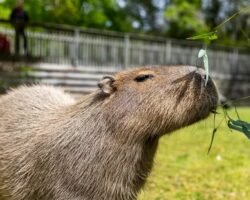
![How To Get a Pet Capybara Uk [Step By Step] How To Get a Pet Capybara Uk](https://capybaratips.com/wp-content/uploads/2023/03/Uk-Capybara-250x200.webp)
![How To Get A Capybara In China [Steps By Steps] China-Capybara](https://capybaratips.com/wp-content/uploads/2023/03/China-Capybara-250x200.webp)
![Where Can I Buy a Capybara Near Me? - [Recommended] Where Can I Buy a Capybara Near Me](https://capybaratips.com/wp-content/uploads/2023/03/Near-Me-250x200.webp)
